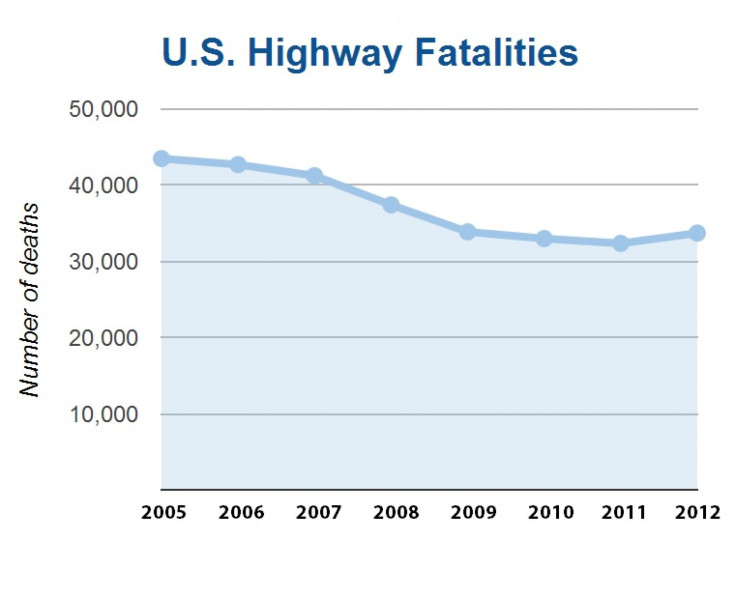US Traffic Fatalities Up Slightly In 2012 As Alcohol-Related Mayhem Rises 5 Percent, According To The Latest Data

Slightly more than 1,000 people were killed in 2012 on U.S. highways compared to the previous year, according to data released Thursday by the National Highway Traffic Safety Administration (NHTSA). But despite the 3 percent increase, to 33,561 fatalities, deaths remain at historic lows.
Among the other findings: Deaths related to driving under the influence of alcohol jumped 5 percent, to 10,322, with most incidents involving drivers with blood-alcohol levels over twice the legal limit of 0.08 percent.
The number of highway deaths last year were at levels unseen since 1950, when the U.S. had about 70 million cars compared to more than 254 million today, according to data from the U.S. Bureau of Transportation Statistics.
"Highway deaths claim more than 30,000 lives each year, and while we've made substantial progress over the past 50 years, it's clear that we have much more work to do," said U.S. Transportation Secretary Anthony Foxx in a statement announcing the data.
Motorcycle and semi-truck drivers saw an increase in death for the third consecutive year, by 7.1 percent and 8.9 percent, respectively. The data also shows that nearly two-thirds of people who die in nighttime car accidents in 2011 weren’t wearing seatbelts.
The NHTSA has only recently started tracking deaths caused by distracted driving, and say it’s still working on improving how it captures and quantifies data. This year it estimates that deaths from distracted driving ticked down to 3,328 from 3,360 while injuries from distracted driving increased 9 percent to about 421,000.
Mississippi topped the list of states that saw the biggest reduction in auto-related fatalities, while New Jersey saw the biggest decline in alcohol-related fatal accidents.

It’s interesting to note that since 1976 the year-over-year quarterly reductions in the number of fatalities on U.S. highways occurred in periods that continued economic recessions. Now, correlation doesn’t imply causation, but it would make sense if there was, say, less cargo movement on the nation’s highways, or fewer road trips from cash- strapped Americans. If that’s the case then economic recessions have their bright sides in the form of less blood on the pavement.
© Copyright IBTimes 2024. All rights reserved.






















